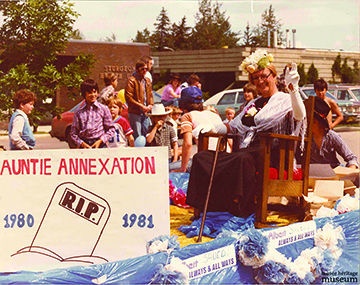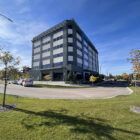Then & Now
St. Albert protests, Then and Now
By: Gene Kosowan Photography: Musee Heritage Museum
April, 2024
A retro look at rallies and protests that tend to reflect the pride folks have for the city
St. Albert is recognized as the province’s oldest unfortified community and a municipality listed
by destination pundits as one of the best cities in Canada, if not the world. Given those accolades, one might think the locals wouldn’t have much to complain about. Granted, protests in the city over heady issues like human rights are rare, since nearby Edmonton is almost always ground zero for such rallies. But if anything, St. Albertans tend to get pretty vocal about matters specific to their city, indicative of the pride they have for this community. Here’s a look at a few instances.
BEAT the Bounds (1979-1981)

With Edmonton’s population at around 600,000 and quickly growing, its city council applied to annex nearly 2,000 square kilometers of land that would quadruple Edmonton’s size. That included absorbing all of St. Albert, which had already been incorporated as a city. According to news site Taproot and archives at the Musee Heritage Museum, Edmonton’s northwestern neighbour objected to the bid and the quickly-formed St. Albert Citizens’ Committee, led by former mayor Richard Plain, fought tooth and nail against the proposal.
The committee spearheaded a “BEAT the Bounds” advertising campaign, organized protest rallies on the streets, and outdoor events to combat the annexation plan, while voters in
St. Albert outright rejected the expansion in a plebiscite. In 1982, the provincial government gave Edmonton the green light to a different annexation plan, one that left St. Albert alone.
Aurora Place (2010)
Residents in the neighbourhood of Akinsdale didn’t have to take to the streets to protest a proposed Habitat for Humanity development in their part of the city. Instead, hundreds of them packed the seats in City Hall to state their case. According to the CBC, many felt the 58-unit endeavour geared towards
low-income families would create traffic problems and many issues associated with density.
But a letter issued a few months later addressed to the St. Albert Gazette tarred the optics of the complainants and angered Akinsdale residents, when the author claimed that the presence of residents in the proposed complex would attract crime and decrease living standards. The project, eventually called Aurora Place, was scaled back to a 30-duplex development and completed in 2013.
Idle No More (2013)
Aboriginal solidarity reached a peak with the launch of the Idle No More movement, originally triggered by the federal government’s omnibus bill that deregulated environmental protection of forests and waterways. In response, the indigenous community organized a series of flash mobs and gatherings across the country and St. Albert was definitely included in the mix.
CTV reported that one day in January, dozens of participants converged at the junction of St. Albert Trail and Sturgeon Road to perform a round dance and smudge ritual. Despite complaints about traffic delays, the half-hour event took place without incident.
Grandin’s flash mob of kindness (2018)
One family in the Grandin neighbourhood was shocked to find a letter in their mailbox that took issue over where they chose to live. The message was blunt and racist, with lines that included “We don’t like your kind around here,” and “Go back to the reserve where Indians belong.” A CBC story indicated that the mother expressed fear over her childen’s safety, while the RCMP opened an investigation into the matter.
Meanwhile, Global reported that a concerned neighbour decided to create a flash mob of kindness to support the distressed household, an event that challenged the hatred in the anonymous letter by showcasing a kinder, gentler side of Grandin.
Child sex offender protest (2020)
St. Albert residents were livid over the release of a child sex offender who chose to reside in the city, more specifically, a home near where one of his victims lived. When the RCMP got word out in June that Donald George Dupuis was out of jail after serving a year-long sentence and was described as a
high-risk offender, locals took a chance anyway to stage a protest at the home where he was staying.
The St. Albert Gazette reported that more than 50 people showed up for the impromptu rally, which lasted two days. Although one resident of the home traded harsh words with protesters at one point, no serious incidents occurred.
Sturgeon Hospital rollbacks (2021)
When the provincial government was proposing rollbacks to nursing wages in July, several employees at Sturgeon Community Hospital decided to make their voices heard
on the matter. According to the Edmonton Journal, roughly 75 off-duty nurses demonstrated against the proposal which would have shaved off three percent of their earnings, killed lump-sum payments issued every six months, and cut down premiums on shift and weekend stints.
The United Nurses of Alberta were also negotiating a new contract at the time. The government backed down a few months later, after realizing the importance of nurses on the front lines of the COVID pandemic.
Freedom Convoy (2022)
Ottawa was undoubtedly ground zero for the Freedom Convoy, a rally originally involving truckers protesting mandatory COVID vaccinations for cross-border shippers, but grew to defy government measures to combat the virus. Still, most cities caught first-land looks at the convoy, including St. Albert.
In February, an independent YouTube video documented residents dotting the curbs of St. Albert trail cheering on a massive armada of 18-wheelers converging on the Legislative Building in Edmonton, where a demonstration was slated to take place. Although Edmonton events were mostly peaceful, Ottawa’s month-long rally resulted in 300 arrests and the federal government’s invocation of the Emergencies Act, which a federal court ruling determined was unjustified two years later.













